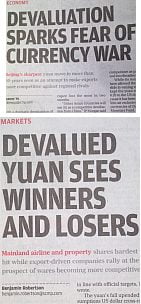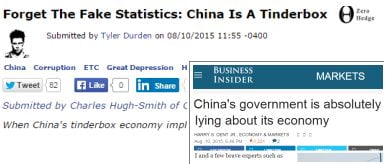Economists and commentators go into frenzied-chatter mode as China devalues its currency by 1.9%. What, they all wonder, does it mean?
As an export-booster, the move is a drop in the competitiveness bucket – enough to shave a few pennies off the price tag on a Shenzhen-made T-shirt in Walmart’s. To the extent it does make exports cheaper/imports pricier, it undermines Beijing’s aim of moving away  from the export model to greater domestic consumption. More reassuringly, perhaps, being hitched to the US Dollar has pushed the Yuan up a lot against other currencies like the Euro, so this is all OK on a trade-weighted basis.
from the export model to greater domestic consumption. More reassuringly, perhaps, being hitched to the US Dollar has pushed the Yuan up a lot against other currencies like the Euro, so this is all OK on a trade-weighted basis.
Another theory is that the Chinese government is simply letting the currency find its own market level; offshore Yuan trading suggests the official exchange rate was a bit too high. This might also help convince the IMF to include the Yuan in its SDR basket of Big Boys’ Currencies, which Beijing considers important, presumably as a matter of face.
Some observers think the devaluation will help China conserve foreign-exchange reserves. Others think it will encourage capital flight.
Even after sifting through the outpouring of collective wisdom from the Financial Times, Wall Street Journal and all sorts of others, we are none the wiser. Understandably, the international business press is most interested in the repercussions for markets, for other Asian currencies, for the Fed’s one-day-maybe tightening, for Donald Trump’s election bid, and so on. Unlike Hong Kong at the sharp end, they are not so obsessed with trying to peer into the Chinese leaders’ minds.
One clue is the (FT) graph showing the RMB against the USD (up = weaker). As it happens, it shows 2011 to today with a range from RMB6.05 to RMB6.45 – but that’s not the point. Just look at the pattern up close…
A long period of little jiggly bits, then one big jolt. Officials micro-manage and tweak the currency on a daily basis; what has happened here is that someone broke with usual, longstanding behaviour and intervened suddenly and forcefully. By ‘suddenly and forcefully’, we could mean ‘decisively’, or ‘boldly’, or ‘rashly’ or ‘in a rage’, or ‘in a blind panic’ or something else. If this were an electrocardiogram in an emergency room, there would be buzzers going off.
Away from the fancy FT and WSJ, you get – among other things – juicier, more-lurid headlines, like these…
Bear in mind that China is officially cruising along at a no-problem, as-planned, everything’s-cool 7% GDP growth rate. The funny thing is that both these pieces appeared on Monday – one day before Beijing’s currency move. The Business Insider article mentions particular data showing levels of freight, power consumption and car sales all dropping in China. This fits with things going on in overseas economies exposed to China: Singapore GDP suddenly shrinking, Hong Kong’s luxury-goods sales falling, Korean components shipments down, Australia suffering as commodities soften.
And what are Beijing’s own smooth, suave, super-confident, 7%-growth leaders doing up there right now? As well as devaluing after they said they wouldn’t, they are pulling levers like crazy to prop up their absurd stock market, begging citizens to holiday at home, blacklisting 120 evil pop songs, fine-tuning Hong Kong U – not to mention arresting lawyers who if anything help pacify citizens – and generally, maybe, losing it.
We have no way of knowing what they know or don’t know. Maybe the Communist Party chiefs think they’re in deep trouble when actually things are OK: they are overreacting, and stuff like military corruption and pollution and debt will all blow over, no problem. Or maybe they’re trying to pretend the country is fine when they – and their buddies pulling wealth out of China – know things are actually falling apart. That’s the problem with hyper-secretive paranoiacs: you just don’t know whether they are right to be freaking out.
All we can say is that, for us in Hong Kong, our de facto US Dollar currency and our lamentable unpatriotic reluctance to integrate with the motherland never felt better.



Perhaps, XJP or someone tugging his emotive strings is laying the foundations for a Rothchild method of growing their fortune; but my guess is everyone is just guessing.
It’s not just markets, but anything to do with the future is chaotic; even the best strategy only works some of the time and sooner or later even the “worst’ strategy pays off very handsomely. Fukushima’s owners paid for a PSA analysis which predicted their reactor meltdown probably was 1:10×7, and loss of containment so low as to be incalculable (they removed reference to the study from their website even before they announced the loss of containment). Care to calculate the actual rates using hindsight?
“What the thinker thinks, the prover proves.” but always nature remains indifferent.
Larry Swedroe, writing for CBS Money Watch asks, “Why do people listen to Harry Dent in light of his obvious inability to accurately predict the future?” (attribution: WIKIPEDIA)
Is the US really any different from China? The PPT has been managing the markets since 1988. The Fed has been attacking gold since 1971. And a Deep State runs the land of the free. (ATTRIBUTION: ZEROHEDGE)
@BUSYBODY – is Harry Dent an official adviser to our Financial Secretary? His forecasts display the same pinpoint inaccuracy.
I’ve a feeling that this was basically a bone-headed attempt at window-dressing, with the sole aim of converging the fix with spot because the peskily persistent basis between the two probably looked bad to Beijing eyes with a SDR fetish (never mind the Big Picture stuff about having daily price limits and a central bank-declared mid point for your currency in the first place. CCP prefers make-believe, and so sweats the small stuff instead).
I imagine though that when you’ve a lifetime of ruling by diktat, not having to deal with any troublesome backchat, and generally being used to making things true just by saying them, you tend to occasionally omit to consider little things like market sentiment when to do so causes inconvenience. Hundreds, thousands, millions of actors doing their own thing and making up their own minds – which is pretty much what a market is – is a concept contradictory to authoritarianism. But they do think very highly of government-level bodies, like the IMF, and central banks, and so probably realised that PBOC intervening directly in the spot market to push it to converge with the daily fix wouldn’t look good. So, if the mountain will not go to Mohammed… they simply declared the daily fix to be where spot closed the day before! Ta-da!
And so, wham, the rest of the world took it as a signal, and for its part generally sticking to its own make-believe that the PBOC (and China’s ruling class generally) is chock-full of the very brightest and best, replete with PhDs and MBAs from the finest Western schools, saw China was devaluing RMB, and that the only logical reason they would be doing *that* is because their economy is in far worse shape than anyone could have guessed. Surely PBOC, the logic goes, knowing exactly what it is doing at all times, would only do something this extreme and disruptive if they absolutely had to.
PBOC for its part, watching with horror as the global reaction unfolds (and probably dreading a phonecall from the Politburo SDR Speical Taskforce) doubles down – ok, ok, market, we’ll give you what you want! Look, here’s the daily fix, right where you last traded spot! We have converged it! We have made it true! Market forces!
And the global market takes double the fright, and PBOC is forced to come in and sell USD and everyone can see them intervening, and gets even more confused. So they started trying to sort out a small but largely irrelevant ‘optics’ problem, and ended up causing a massive ruction in global markets, firmly embedding the idea in everyone’s mind globally that their economy is definitely a lot worse than they say, and possibly inadvertently starting a currency war. And finally, the mountain, it turned out, was very happy with its distance from Mohammed, and spot is still trading pretty much as high (in USD terms) over the daily fix as it has for the last 9 months. Total mess, and I’m not sure how they’ll get out of this, but I am guessing a National Team-style farce is due shortly. Patriotically Sell USD! Death to Malicious Buying Of USD!
Well done, everybody.
No sooner do I post that (sorry for it being so long) and along comes this headline:
*CHINA SAFE SAID TO ASK BANKS TO LIMIT USD PURCHASES BY SOME COS
Funnily enough, as a physics student I wrote a paper on nuclear reactor safety that stated that the exact thing that happened at Fukushima was incredibly unlikely. My reasoning was that any disaster that caused both a shut-down and a loss of back-up power to the reactor would have to be so massive that if it occurred, a nuclear melt-down would be the least of our worries. I didn’t forsee an earthquake causing shut-down combined with a tsunami flooding the back-up generators, with a failure to re-establish power afterwards in the time left.
FOARP
Humans, we can’t live with them, we can’t live without them. Fukushima’s owners were warned several times, including by members of an IAEA peer review (who the IAEA shamefully then kept quiet) even prior publishing the PRA they commissioned. Yakuza organs (associated with Fukushima contractors) frustrated the career and personal life of the Koji Minoru, the academic who published that the 869 Sanriku Tsunami peaked well above the plant walls.
“What the thinker thinks, the prover proves” but always nature remains indifferent.